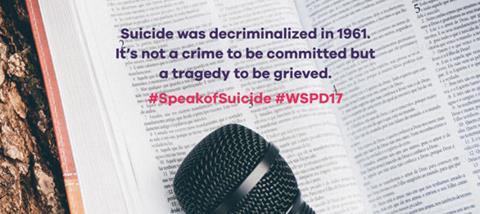
There are words no-one wants to hear. In a world which speaks so openly (and often) about sex, drugs and gender, it seems suicide is a taboo which is yet to be broken.
Often the fear among youth workers is that by talking about suicide, we will somehow “give young people the idea”. In actual fact, asking a young person if they have considered suicide will lessen the stigma and allow them to say words they’d perhaps feared judgement for.
It can be intimidating to bring up the topic of suicide, but it’s important that we do.
One way this could be done helpfully is by looking at a passage in the Bible that talks about suicide and using this as a spring board for the discussion.
For example, in 1 Kings 19, when Elijah begs for death on top of Mount Horeb the angel’s response is not one of condemnation, but compassion. Food, drink and rest are offered along with an acknowledgement that Elijah is having a hard time!
In the Elijah narrative we can see some clear pointers in how to respond when a young person expresses suicidal thoughts.
The first is to encourage them that they have done the right thing by speaking up. Opening up about suicidal thoughts can be incredibly daunting and putting them at ease that they’ve done the right thing is a good place to start.
Secondly, don’t promise confidentiality. It’s important to remember that if you feel a young person is at serious risk to themselves, your line manager and the young person’s guardian will be have to be informed.
Thirdly, encourage them to care for themselves physically, ensuring that they are eating and sleeping enough. This is both a way for them to take positive action and can have a significant impact on our mental health.
Fourthly and most importantly, listen to them. Sometimes at points like this it can be tempting to speak the many reasons a young person has to live. While there is a place for this, the starting place has to be where the young person is so allow them to tell the story of what they’re going through and how they’re feeling.
Fifthly, dealing with a disclosure of suicidal thinking requires sensitive use of language. We may feel strongly that suicide is a waste of life or a stupid thing to do, but don’t communicate in these terms. Being told that suicide is “something silly” immediately makes a person feel judged. Instead use neutral language such as “suicidal thoughts”, “suicide attempts” and “died by suicide”.
Finally, we have to point to hope. Hope not that life will be a breeze from here on, but hope that there will be help accessed, that the young person will feel the love and care, and that they will draw close to God - not feel alienated from his presence.
Speaking of suicide isn’t easy, but as youth workers we are in a prime position to offer an everlasting hope to the hopeless.
For more information on the ThinkTwice #SpeakofSuicide campaign, check out the hashtag on twitter or go to their website.
While you’re here, why not claim your free copy of Premier Youth and Children’s Work?




























